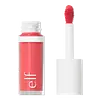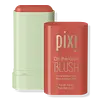What's inside
What's inside
 Key Ingredients
Key Ingredients

 Benefits
Benefits

 Concerns
Concerns

 Ingredients Side-by-side
Ingredients Side-by-side

Hydrogenated Polyisobutene
EmollientHydrogenated Poly(C6-14 Olefin)
EmollientOctyldodecanol
EmollientTrimethylolpropane Triisostearate
EmollientIllite
AbrasiveBoron Nitride
AbsorbentHydrogenated Styrene/Methylstyrene/Indene Copolymer
Trimethylsiloxysilicate
EmollientC9-12 Alkane
SolventAlumina
AbrasiveDisteardimonium Hectorite
StabilisingPhenyl Trimethicone
Skin ConditioningEthylene/Propylene/Styrene Copolymer
Sorbitan Sesquioleate
EmulsifyingPropylene Carbonate
SolventTriethoxycaprylylsilane
Ethylhexylglycerin
Skin ConditioningAluminum Hydroxide
EmollientTin Oxide
AbrasiveButylene/Ethylene/Styrene Copolymer
Pentaerythrityl Tetra-Di-T-Butyl Hydroxyhydrocinnamate
AntioxidantTocopherol
AntioxidantRosa Damascena Flower Water
MaskingWater
Skin ConditioningRicinus Communis Seed Oil
MaskingSodium Hyaluronate
HumectantHydrogenated Castor Oil
EmollientHibiscus Mutabilis Flower Extract
Skin ConditioningPhenoxyethanol
PreservativeCI 77891
Cosmetic ColorantCI 45410
Cosmetic ColorantCI 15985
Cosmetic ColorantCI 19140
Cosmetic ColorantCI 77491
Cosmetic ColorantCI 15850
Cosmetic ColorantHydrogenated Polyisobutene, Hydrogenated Poly(C6-14 Olefin), Octyldodecanol, Trimethylolpropane Triisostearate, Illite, Boron Nitride, Hydrogenated Styrene/Methylstyrene/Indene Copolymer, Trimethylsiloxysilicate, C9-12 Alkane, Alumina, Disteardimonium Hectorite, Phenyl Trimethicone, Ethylene/Propylene/Styrene Copolymer, Sorbitan Sesquioleate, Propylene Carbonate, Triethoxycaprylylsilane, Ethylhexylglycerin, Aluminum Hydroxide, Tin Oxide, Butylene/Ethylene/Styrene Copolymer, Pentaerythrityl Tetra-Di-T-Butyl Hydroxyhydrocinnamate, Tocopherol, Rosa Damascena Flower Water, Water, Ricinus Communis Seed Oil, Sodium Hyaluronate, Hydrogenated Castor Oil, Hibiscus Mutabilis Flower Extract, Phenoxyethanol, CI 77891, CI 45410, CI 15985, CI 19140, CI 77491, CI 15850
Diisostearyl Malate
EmollientCaprylic/Capric Triglyceride
MaskingPolyglyceryl-2 Triisostearate
EmulsifyingCeresin
Emulsion StabilisingTriethylhexanoin
MaskingOzokerite
Emulsion StabilisingPentaerythrityl Tetraisostearate
EmollientHdi/Trimethylol Hexyllactone Crosspolymer
Bis-Diglyceryl Polyacyladipate-2
EmollientRicinus Communis Seed Oil
MaskingHydrogenated Castor Oil
EmollientPhytosteryl/Isostearyl/Cetyl/Stearyl/Behenyl Dimer Dilinoleate
Skin ConditioningHippophae Rhamnoides Oil
EmollientTocopheryl Acetate
AntioxidantAscorbic Acid
AntioxidantErgosterol
Skin ConditioningVitis Vinifera Fruit Extract
Skin ConditioningVaccinium Angustifolium Fruit Extract
Skin ProtectingRubus Idaeus Fruit Extract
AstringentPyrus Malus Fruit Extract
Skin ConditioningPanax Ginseng Root Extract
EmollientHamamelis Virginiana Extract
AntiseborrhoeicFragaria Chiloensis Fruit Extract
Skin ConditioningCitrus Limon Fruit Extract
MaskingCamellia Sinensis Leaf Extract
AntimicrobialAloe Barbadensis Leaf Extract
EmollientHydrogenated Castor Oil Isostearate
Skin ConditioningSilica
AbrasiveWater
Skin Conditioning1,2-Hexanediol
Skin ConditioningPhenoxyethanol
PreservativeCI 77891
Cosmetic ColorantCI 15850
Cosmetic ColorantCI 15985
Cosmetic ColorantDiisostearyl Malate, Caprylic/Capric Triglyceride, Polyglyceryl-2 Triisostearate, Ceresin, Triethylhexanoin, Ozokerite, Pentaerythrityl Tetraisostearate, Hdi/Trimethylol Hexyllactone Crosspolymer, Bis-Diglyceryl Polyacyladipate-2, Ricinus Communis Seed Oil, Hydrogenated Castor Oil, Phytosteryl/Isostearyl/Cetyl/Stearyl/Behenyl Dimer Dilinoleate, Hippophae Rhamnoides Oil, Tocopheryl Acetate, Ascorbic Acid, Ergosterol, Vitis Vinifera Fruit Extract, Vaccinium Angustifolium Fruit Extract, Rubus Idaeus Fruit Extract, Pyrus Malus Fruit Extract, Panax Ginseng Root Extract, Hamamelis Virginiana Extract, Fragaria Chiloensis Fruit Extract, Citrus Limon Fruit Extract, Camellia Sinensis Leaf Extract, Aloe Barbadensis Leaf Extract, Hydrogenated Castor Oil Isostearate, Silica, Water, 1,2-Hexanediol, Phenoxyethanol, CI 77891, CI 15850, CI 15985
 Reviews
Reviews

Ingredients Explained
These ingredients are found in both products.
Ingredients higher up in an ingredient list are typically present in a larger amount.
Ci 15850 is the pigment color red. It is an azo dye and created synthetically.
Azo dyes need to be thoroughly purified before use. This allows them to be more stable and longer-lasting.
This ingredient is common in foundations, lipsticks, and blushes. This color is described as brown/orangey red.
It has many secondary names such as Red 6 and Red 7. According to a manufacturer, Red 6 usually contains aluminum.
Learn more about CI 15850Ci 15985 is a dye made from petroleum. It is synthetically created and approved by the FDA for use in foods and cosmetics.
The color of this dye is orange/yellow.
This ingredient can be found in makeup, sun care, and skincare.
Learn more about CI 15985Ci 77891 is a white pigment from Titanium dioxide. It is naturally found in minerals such as rutile and ilmenite.
It's main function is to add a white color to cosmetics. It can also be mixed with other colors to create different shades.
Ci 77891 is commonly found in sunscreens due to its ability to block UV rays.
Learn more about CI 77891Hydrogenated Castor Oil is created by adding hydrogen to castor oil. This helps stabilize the castor oil and raises the melting point. At room temperature, hydrogenated castor oil is solid.
Castor Oil helps moisturize the skin. It is rich in a fatty acid called ricinoleic acid. This fatty acid helps prevent moisture loss on the skin. This helps keep your skin soft and hydrated. Ricinoleic acid also has anti-inflammatory and pain reducing properties.
As a wax-like substance, Hydrogenated Castor Oil acts as an emollient. Emollients help keep your skin stay soft and smooth by creating a barrier. This barrier helps trap moisture.
Hydrogenated Castor Oil may not be fungal-acne safe. We recommend speaking with a professional.
Learn more about Hydrogenated Castor OilPhenoxyethanol is a preservative that has germicide, antimicrobial, and aromatic properties. Studies show that phenoxyethanol can prevent microbial growth. By itself, it has a scent that is similar to that of a rose.
It's often used in formulations along with Caprylyl Glycol to preserve the shelf life of products.
Ricinus Communis Seed Oil is the INCI name for castor oil.
Castor Oil helps moisturize the skin. It is rich in a fatty acid called ricinoleic acid. This fatty acid helps prevent moisture loss on the skin. This helps keep your skin soft and hydrated. Ricinoleic acid also has anti-inflammatory and pain reducing properties.
Besides hydrating the skin, castor oil is also used to hydrate hair. By keeping the hair shaft moisturized, breakage is decreased. More studies are needed to show castor oil's effective on stimulating hair growth.
Castor oil is created by cold-pressing castor seeds and then purifying the oil with heat. It was used in Ancient Egypt as fuel in lamps and to help treat eye irritation.
The term 'fragrance' is not regulated in many countries. In many cases, it is up to the brand to define this term. For instance, many brands choose to label themselves as "fragrance-free" because they are not using synthetic fragrances. However, their products may still contain ingredients such as essential oils that are considered a fragrance.
Learn more about Ricinus Communis Seed OilWater. It's the most common cosmetic ingredient of all. You'll usually see it at the top of ingredient lists, meaning that it makes up the largest part of the product.
So why is it so popular? Water most often acts as a solvent - this means that it helps dissolve other ingredients into the formulation.
You'll also recognize water as that liquid we all need to stay alive. If you see this, drink a glass of water. Stay hydrated!
Learn more about Water